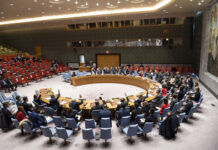Photo Credit: Global Diaspora News (www.GlobalDiasporaNews.com).
If Rishi Sunak loses next week’s general elections in the United Kingdom, as is widely expected, he will be the first British prime minister since the end of the Cold War never to have visited the United Nations while in office. Sunak skipped the annual high-level meeting of the U.N. General Assembly last September. If the polls are to be believed, Labour leader Keir Starmer will almost certainly be at the podium in New York this coming September.
The U.N. is not exactly at the heart of the British election campaign. The U.K.’s place in Europe and the threat of Russian aggression are much higher foreign policy priorities. Most voters focus on domestic concerns anyway. But a Labour government will still have to decide how much political capital to invest in multilateralism, at a time when international tensions buffet the U.N. system.
Since 2010, successive Conservative prime ministers have treated the U.N. with varying degrees of warmth and suspicion. David Cameron had no great fascination with international cooperation, unlike his Labour predecessor, Gordon Brown. Cameron nonetheless saw value in promoting the U.K. as a progressive internationalist power, and he bolstered its standing by passing legislation committing the U.K. to spend 0.7 percent of its Gross National Income on foreign aid, as per the U.N.’s recommended target for wealthy countries. He also co-chaired a panel convened by Secretary-General Ban Ki-moon that helped pave the way for the U.N.’s Sustainable Development Goals.
In retrospect, some of Cameron’s decisions at the U.N. look questionable. He was a strong advocate for a robust Security Council response to the war in Libya in 2011, which some observers welcomed as the “Responsibility to Protect” in action, but which also alienated many African states. Nonetheless, it is fair to say that Cameron saw the U.K.’s place in the U.N. as important and took steps to strengthen it.
Cameron’s successor, Theresa May, was too busy with Brexit to devote time to the U.N., although she took an interest in international efforts to end human trafficking and other forms of modern slavery. After having dethroned May in 2019, Boris Johnson took a typically chaotic and incoherent approach to multilateral affairs. On the upside, the U.K. hosted the U.N. COP26 Climate Change Conference in Glasgow in 2021. On the downside, Johnson—abetted by Sunak as then-chancellor of the exchequer—cut back on foreign aid, denting British influence at the U.N. and in developing countries.
Of all the post-Brexit Tory leaders, Liz Truss was the most skeptical toward the U.N., arguing that the U.K. and like-minded democracies should work through alternative structures like the G7. Since leaving office, she has argued that the U.N. should be abolished altogether, in light of China’s and Russia’s influence in the institution. Officials who worked with Truss on international affairs tend to have a rather haunted look when reflecting on the experience, although her time in office—just 49 days—was too brief to affect the U.N. system.
It’s also worth noting that the two days Truss spent attending the U.N. General Assembly in September 2022 represents the greatest time commitment to the institution as a proportion of her term—a little over 4 percent—of any British prime minister.
British diplomats deserve credit for maintaining a solid front at the U.N. even during the havoc of the May-Johnson-Truss premierships. Rather than allow the Brexit mess to poison multilateral cooperation, British officials kept up good working relations with their European counterparts in New York and Geneva. In 2020, the U.K. sided with Germany and France to block an effort by the Trump administration to restore previously suspended U.N. sanctions resolutions on Iran. Russia’s all-out aggression against Ukraine in 2022 also spurred the U.K. and its allies to work more closely at the U.N. as they lobbied others to condemn Moscow in the General Assembly.
As Sunak’s no-show at the General Assembly last September indicated, the latest Conservative premier is not especially interested in the United Nations. His most consequential political decision regarding the Security Council has been to stick close to the Biden administration over the Israel-Hamas war in Gaza, which has frustrated many other U.N. members. But Sunak’s two successive foreign secretaries, first James Cleverly and now the politically reborn Cameron, have both favored bolstering outreach to non-Western countries through international institutions. Cameron has also made a point of talking up Britain’s commitment to international aid. The current Conservative election manifesto flags London’s efforts to help poorer countries get access to financing, which is a major topic of contention in U.N. debates, even if it is unlikely to cause excitement among British voters.
In any case, with the Tories now facing an electoral catastrophe, Labour’s views on multilateralism are of greater importance. In opposition, the party has also been on a rather winding journey with regards to the multilateral system since 2010. Jeremy Corbyn, its hard-left leader from 2015 to 2019, was a fan of the U.N., in contrast to his obvious distrust for NATO. The party’s election manifesto for the 2019 general election, which Corbyn lost decisively to Johnson, included commitments to boost spending on U.N. peacekeeping, promote U.N. reforms and back a U.N. human rights investigation in Sri Lanka.
Keir Starmer appears supportive of multilateral cooperation but cautious about its prospects.
Corbyn’s successor, Keir Starmer, appears supportive of multilateral cooperation but more cautious about its prospects. The current Labour election manifesto warns that “multilateral institutions remain indispensable, but they are struggling under the strains of new global challenges.” It promises to reinforce the U.N., along with the G7, G20 and other organizations, but goes into no detail as to how. In a recent pamphlet, Labour’s shadow foreign secretary, David Lammy, promised to find ways to stop Russia from using its veto to block criticism of its actions in Ukraine. But as British diplomats will surely advise, such reform proposals are very hard or impossible to implement in practice.
Crucially, both the Labour and Conservative manifestos indicate that neither party sees a real prospect of restoring the 0.7 percent aid target in the immediate future, if ever. The Liberal Democrats—Britain’s traditionally internationalist third party—promise to reverse the aid cut, but are also a little fuzzy on the timeline for doing so. The Green Party, a small outfit but one with traction in progressive areas, makes a concrete promise to raise aid spending to 1 percent of GNI by 2033. But overall, it seems unlikely that the U.K. will return to the days of generous funding for aid.
More broadly, a Labour government under Starmer will be focused elsewhere than Turtle Bay. Sorting out a working relationship with the European Union and bolstering NATO to address Russia will inevitably take precedence over most U.N. business. And if Donald Trump wins the U.S. presidential election in November, managing relations with Washington will be crucial.
Nonetheless, the incoming Labour government can look to the U.N. as a space where it can engage with the Global South. It can advance some initiatives, such as efforts to improve the performance of the international financial institutions in assisting financially weak states, that are already in the works. Many U.N. members will also hope that the next British government is more front-footed in efforts to resolve the Israeli-Palestinian conflict. The U.K. may not be able to lead at the U.N. as it once did, but it can still be a solid player of the multilateral game.
This article was originally published on the World Politics Review website.
Source of original article: RSS (www.crisisgroup.org).
The content of this article does not necessarily reflect the views or opinion of Global Diaspora News (www.GlobalDiasporaNews.com).
To submit your press release: (https://www.GlobalDiasporaNews.com/pr).
To advertise on Global Diaspora News: (www.GlobalDiasporaNews.com/ads).
Sign up to Global Diaspora News newsletter (https://www.GlobalDiasporaNews.com/newsletter/) to start receiving updates and opportunities directly in your email inbox for free.


































